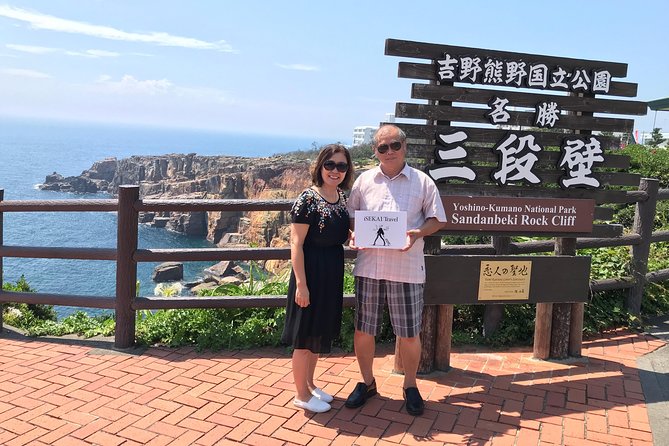Nestled within the bustling cityscape of Tokyo, Tsukiji and Asakusa stand as two hidden gems, waiting to be discovered.
Like precious jewels hidden beneath layers of concrete and glass, these major complexes offer a glimpse into the rich tapestry of Japanese culture.
Tsukiji, once the world’s largest fish market, immerses visitors in the vibrant world of seafood, from mesmerizing tuna auctions to mouthwatering sushi.
In contrast, Asakusa whisks you away to a bygone era, with its historic temples, narrow streets, and bustling markets.
Whether you’re a culinary connoisseur, history buff, or simply seeking an authentic cultural experience, Tsukiji and Asakusa beckon you to uncover their secrets and create unforgettable memories in the heart of Tokyo.
Great News! You can reserve your spot for free with Viator. You can easliy cancel any time up to 1 day before without paying anything.
Quick Takeaways
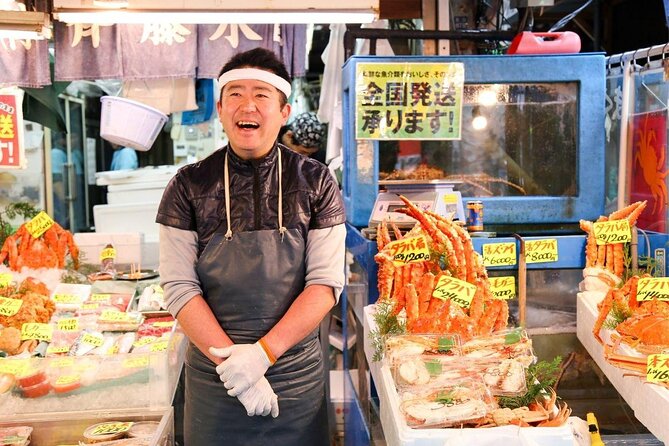
- Tsukiji Fish Market is one of the largest wholesale fish markets in the world, offering a wide variety of fresh seafood delicacies.
- Asakusa Temple, also known as Senso-ji, is one of the oldest and most significant Buddhist temples in Tokyo, showcasing traditional Japanese temple architecture and offering cultural activities and festivals.
- Tsukiji and Asakusa are known for their traditional crafts and souvenirs, such as Japanese pottery and textiles, which capture Japan’s cultural heritage and serve as mementos of the visit.
- Both Tsukiji and Asakusa offer unique culinary experiences, with Tsukiji Fish Market offering fresh sushi and Asakusa known for its street food specialties like tempura and monjayaki.
Not for you? Here's a few more great tours and experiences nearby.
Tsukiji Fish Market
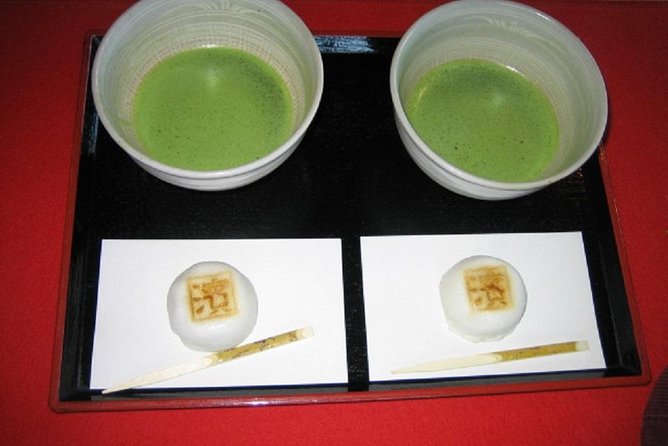
The Tsukiji Fish Market is a bustling hub for seafood enthusiasts and culinary adventurers. Located in Tokyo, Japan, it’s one of the largest wholesale fish markets in the world. This iconic market offers a wide variety of fresh seafood delicacies that attract visitors from all over the globe.
As soon as you step foot into Tsukiji Fish Market, you’re greeted by an overwhelming display of vibrant colors and enticing aromas. The market is divided into two sections: the inner market, where the famous tuna auctions take place, and the outer market, which is filled with stalls selling everything from sushi to dried seafood.
Whether you’re looking to sample some of the freshest sushi in the world or simply want to experience the energetic atmosphere, a visit to Tsukiji Fish Market is a must for any food lover.
You can also read our reviews of more tours and experiences in Tokyo.
Asakusa Temple
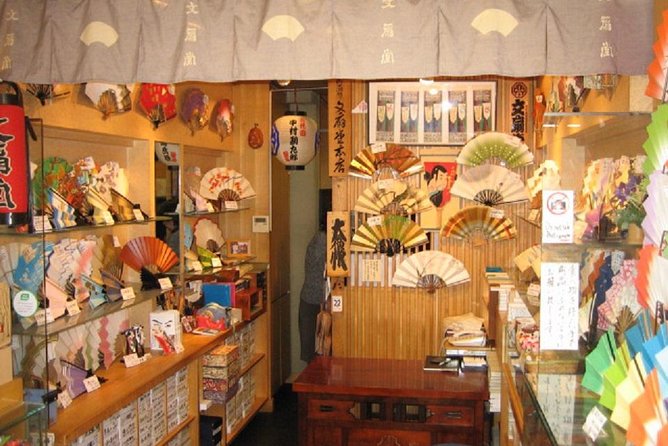
Continuing the exploration of Tokyo’s vibrant cultural attractions, Asakusa Temple offers a captivating glimpse into Japan’s rich history and spiritual traditions. This iconic Buddhist temple, also known as Senso-ji, is one of the oldest and most significant religious sites in the city. Here are four reasons why Asakusa Temple is a must-visit destination:
- Architecture: The temple’s stunning architectural design showcases traditional Japanese craftsmanship. From its majestic main gate, known as Kaminarimon, to the intricately decorated buildings and pagodas, every detail reflects the beauty and grace of Japanese temple architecture.
- History: Asakusa Temple has a fascinating history that dates back over 1,300 years. It was founded in 628 and has survived wars and natural disasters, making it a symbol of resilience and cultural heritage.
- Cultural Significance: The temple is a hub of cultural activities and events, attracting visitors from all over the world. From traditional ceremonies and festivals to art exhibitions and performances, Asakusa Temple provides a vibrant and immersive experience of Japanese culture.
- Spiritual Traditions: Asakusa Temple is a place of worship and pilgrimage for Buddhists. Visitors can participate in rituals such as lighting incense, making offerings, and praying for good fortune and blessings.
With its awe-inspiring architecture and rich history, Asakusa Temple is a must-visit destination for anyone seeking a deeper understanding of Japan’s cultural and spiritual traditions.
Traditional Crafts and Souvenirs
Visitors can explore a variety of traditional crafts and souvenirs at Tsukiji and Asakusa, seeing the rich cultural heritage of Japan.
At Tsukiji, they can discover a wide range of Japanese pottery, renowned for its exquisite craftsmanship and unique designs. From delicate tea sets to intricately painted plates, there’s something for every pottery enthusiast.
As for Asakusa, visitors can indulge in traditional textiles, such as beautiful kimono fabrics and intricately woven tapestries. These textiles showcase the intricate artistry and attention to detail that’s characteristic of Japanese craftsmanship.
Whether it’s a handcrafted pottery piece or a stunning textile, these traditional crafts and souvenirs serve as wonderful mementos of one’s visit to Tsukiji and Asakusa, capturing the essence of Japan’s cultural heritage.
Local Cuisine and Street Food
At Tsukiji and Asakusa, visitors can indulge in the local cuisine and street food, experiencing the vibrant flavors and culinary delights of Japan.
Here are four must-try culinary experiences at these famous destinations:
- Sushi at Tsukiji Fish Market: As one of the largest fish markets in the world, Tsukiji offers an incredible array of fresh seafood. Enjoy the freshest sushi made with the finest ingredients, from fatty tuna to delicate sea urchin.
- Tempura at Asakusa: Take a stroll down Nakamise Shopping Street in Asakusa and treat yourself to some mouthwatering tempura. Crispy on the outside and tender on the inside, these deep-fried delights are a popular choice among locals and travelers alike.
- Takoyaki at Tsukiji Outer Market: Head to the Tsukiji Outer Market and try some takoyaki, a popular street food snack. These bite-sized balls are filled with diced octopus and topped with savory sauce, mayonnaise, and bonito flakes.
- Monjayaki in Asakusa: Monjayaki is a Tokyo specialty that resembles a savory pancake. Visit one of the monjayaki restaurants in Asakusa and watch as the skilled chefs cook up this delicious dish right in front of you.
Whether you’re exploring the bustling local food markets or trying out the diverse street food, Tsukiji and Asakusa offer a culinary adventure that shouldn’t be missed.
Cultural and Historical Landmarks
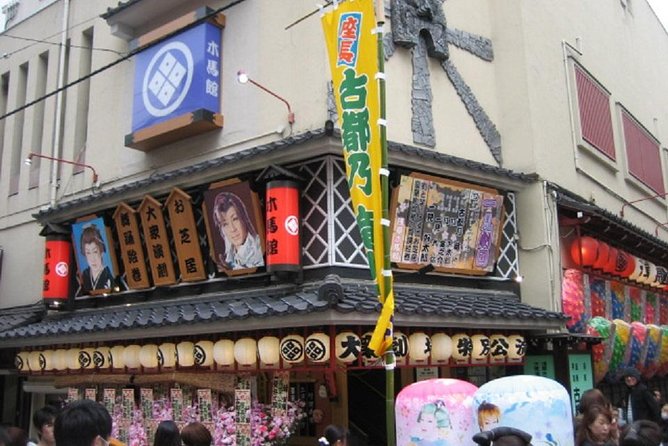
Tsukiji and Asakusa’s cultural and historical landmarks showcase Japan’s rich heritage and captivate visitors with their timeless beauty. These areas are renowned for their cultural preservation and architectural heritage, offering a glimpse into Japan’s past.
Tsukiji, home to the famous Tsukiji Fish Market, also boasts historical sites such as the Tsukiji Honganji Temple and Hama-rikyu Gardens.
Asakusa, on the other hand, is known for its iconic Senso-ji Temple, which dates back to the 7th century. The temple’s majestic architecture and vibrant atmosphere make it a must-visit destination for travelers. Plus, Asakusa is home to the Nakamise Shopping Street, a bustling marketplace that has been in existence for centuries.
These cultural and historical landmarks in Tsukiji and Asakusa offer visitors a unique opportunity to enjoy Japan’s rich history and architectural marvels.
- Things To Do In Tokyo In November
- Things To Do In Tokyo In March 2024: Tokyo’s Best March Events
- Things To Do In April In Tokyo 2024: Tokyo’s Best April Events
- Things To Do In Tokyo In December 2023: Tokyo’s Best December Events
- Tokyo’s Weather And Seasons: A Guide For The Perfect Visit
- Tokyo Midtown Cherry Blossom Season
Frequently Asked Questions
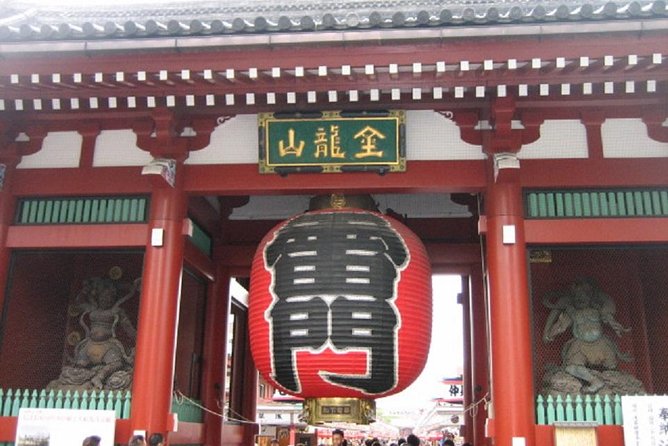
How Do I Book a Tour to Tsukiji Fish Market and Asakusa Temple?
To book a tour to Tsukiji Fish Market and Asakusa Temple, visit Viator’s website. The booking process is simple and straightforward. Choose the desired tour, select the date and time, and complete the payment. The best time to visit is early in the morning to experience the vibrant atmosphere and fresh seafood.
What Is the Cancellation Policy for Tours to Tsukiji Fish Market and Asakusa Temple?
The cancellation policy for tours to Tsukiji Fish Market and Asakusa Temple allows for a full refund if canceled at least 24 hours in advance. Viator recommends local restaurants in the area for a complete cultural experience.
Can I Customize My Tour to Include Visits to Traditional Crafts and Souvenirs Shops?
Yes, customers can customize their tour to include visits to traditional crafts and souvenir shops. Viator offers a range of customization options to cater to individual preferences and interests. Customers can explore local artisans and find unique souvenirs to take home.
Are There Any Vegetarian or Vegan Options Available for the Local Cuisine and Street Food in Tsukiji and Asakusa?
Vegetarian and vegan options are available for local cuisine and street food in Tsukiji and Asakusa. Travelers can enjoy vegetarian-friendly sushi options and explore various vegan street food options in these areas.
Can You Recommend Any Additional Cultural and Historical Landmarks to Visit in Tsukiji and Asakusa?
Additional cultural and historical landmarks in Tsukiji and Asakusa include Senso ji Temple, a stunning Buddhist temple with a rich history, and Tokyo Skytree, a modern architectural marvel offering panoramic views of the city.
The Sum Up
To sum it up, Tsukiji and Asakusa are two major complexes in Tokyo that offer unique and captivating experiences.
Tsukiji allows visitors to enjoy the bustling seafood industry and indulge in delicious sushi.
Asakusa, on the other hand, takes you back in time with its historic temples and traditional markets.
Whether you’re a food lover, culture enthusiast, or history buff, these hidden gems aren’t to be missed on your visit to Tokyo.
Explore the heart of these districts and uncover the secrets that make them truly special.
More Tour Reviews in Tokyo
- Tokyo Airport Transfers: Tokyo City to Tokyo-Narita Airport NRT in Business Car
- Private & Custom TOKYO Day Tour Toyota COMMUTER (Max 13 Pax)
- Private Transfer From Tokyo Port to Tokyo Haneda Int Airport(Hnd)
- Shinjuku Golden-Gai and Kabuki-Cho Bar Hopping With Master Guide
- SHIMOKITAZAWA Local Walking Tour
- Small Group Iaido Class in Tokyo
Not for you? Here's more nearby things to do in Tokyo we have reviewed
- Tokyo Airport Transfers: Tokyo City to Tokyo-Narita Airport NRT in Business Car
- Private & Custom TOKYO Day Tour Toyota COMMUTER (Max 13 Pax)
- Private Transfer From Tokyo Port to Tokyo Haneda Int Airport(Hnd)
- Shinjuku Golden-Gai and Kabuki-Cho Bar Hopping With Master Guide
- Small Group Iaido Class in Tokyo
- Private Casual Photoshoot Tour in Tokyo
- Private Transfer From Tokyo City Hotels to Sendai Cruise Port
- Private Transfer From Tokyo Narita Int Airport(Nrt) to Tokyo Port
- Okonomiyaki Cooking,Japanese Sake Free Flowing Experience
- Mt. Fuji Majestic Tours : Shinjuku to Arakurayama and Beyond
- Private Transfer From Tokyo Cruise Port to Tokyo Hotels
- Private Transfer From Nagasaki Hotels to Nagasaki Cruise Port

